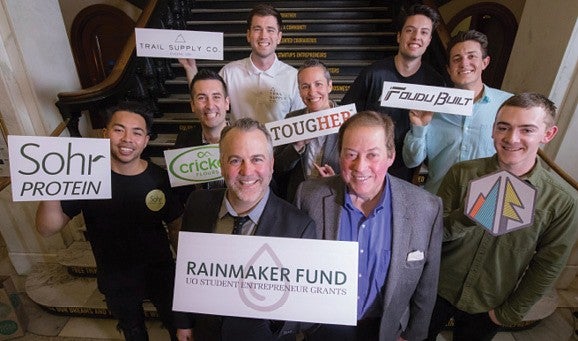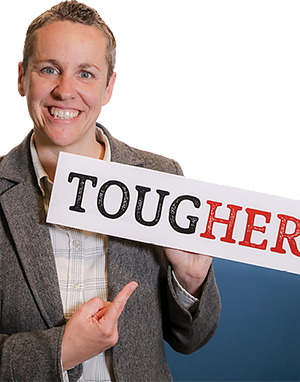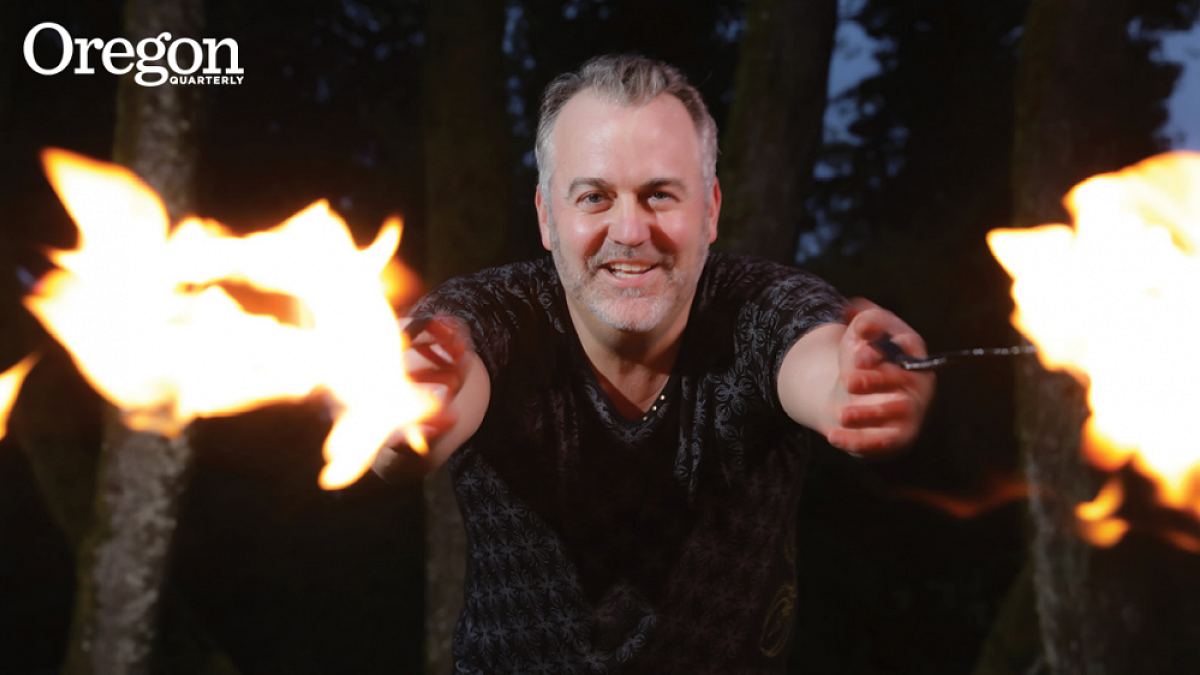 Think Duck Pond, not Shark Tank, and you’ll know what’s different about the University of Oregon’s approach to hatching future entrepreneurs.
Think Duck Pond, not Shark Tank, and you’ll know what’s different about the University of Oregon’s approach to hatching future entrepreneurs.
The belief that flocking together beats survival of the fittest as a business philosophy traces back two decades to the UO dorm room where Paul Anthony Troiano came up with a billion-dollar idea and dubbed it Rumblefish. By the time he sold it to a private equity firm in 2013, it had become the world’s largest independent music licensing company, garnering millions in royalties from YouTube and other channels for composers and musicians.
Troiano credits much of his success to help he received from UO law and business professors. Now he’s paying it forward by helping up to five UO students a year launch companies through the RainMaker Fund, the endowment he set up to provide seed money and advice to each winner. “The goal is to create a clear path for student entrepreneurs and remove some obstacles like they were removed for me,” he says.
Troiano was close to finishing a bachelor’s in music composition and recording technology in 1999 when he pitched his wild idea for Rumblefish to finance professor Philip Romero, then dean of the Charles H. Lundquist College of Business. “I knew nothing about music publishing,” Romero says. “Frankly, I thought it would be a real challenging business at the time, but Paul had a vision and a spirit that I wanted to encourage more students to have.”
Thanks to Romero, Rumblefish became the guinea pig for the UO’s first student business incubator. But that wasn’t all he did. “Phil introduced me to industry leaders who could answer my questions about what to do next,” Troiano says. “He even invested $5,000 in Rumblefish when all I had to my name was a drum set, an ancient Ford Escort, and a Chevron card. My company never would have happened if it wasn’t for the generosity of Philip Romero.”

The story of Starve Ups, which has offices in Portland and Eugene that serve as launch pads for young companies, is vintage Troiano, the epitome of his flock-together philosophy.
The scene is a parking lot in Portland, Oregon, 20 years ago. Six fledgling CEOs stand around, swapping war stories. Minutes earlier, they competed fiercely for a $50,000 Angel Oregon grant (Troiano won). But now, realizing they face the same challenges, they decide to form a support group—Starve Ups. Each went on to tremendous success. In June, Starve Ups cofounder Miguel McKelvey of We Work, the $20 billion global office rental giant, gave the 2018 UO commencement address.
What’s striking about Starve Ups is the altruism. Members do not take equity in each other’s companies, and there are no membership fees. Troiano describes it as a “Jedi council of business friends who help each other succeed.” Compared to their peers, Starve Ups companies are six times more likely to stay in business, four times more likely to secure funding, and four times more likely to sell through acquisition, according to John Friess, Starve Ups cofounder and executive director.
Impressive, but going back to that parking lot? Troiano had no idea that the support group he helped found would one day save his own young company. When fire destroyed the Rumblefish offices in downtown Portland five years later, a frantic Troiano called for a “hot seat,” Starve Ups lingo for an emergency in-person meeting. Instantly, a member offered office space at no cost. Another loaned spare computers and office equipment. “We didn’t miss a beat,” Troiano says. “The group helped keep us afloat for six months.”
Such experiences fuel Troiano’s passion for creating “an ecosystem to help student entrepreneurs survive, strive, and thrive.” Now he hopes to enlist fellow Ducks in building the RainMaker program’s capacity through gifts.
“It’s so exciting to watch what students are doing with these RainMaker grants,” he says. “The things they’ve built, the people they employ, and the impact they’re making on local Oregon communities. Let’s put more lights on the path for students with great ideas.”
RainMakers on the Move
Andrew Ek, MA ’17 (conflict and dispute resolution), is one of the first 15 RainMaker grant winners. The $5,000 prize allowed him to incorporate his company, Sohr Performance + Nutrition, apply for a trademark, and buy ingredients to debut soy and dairy-free recovery shakes. “It’s an incredible program and it has made a huge impact on my business,” Elk says.
In addition to cash, RainMaker winners receive membership in Starve Ups. Kate Blazar, MBA ’16 (general business), says the peer support is invaluable as her business, Animosa, ramps up to meet demand for “Go With Your Flow,” an eco-friendly outdoor and travel menstrual kit.
“It would have taken significantly longer to launch and go to market without the RainMaker program,” she says. “Paul’s commitment to giving back and supporting others’ entrepreneurial aspirations is inspiring.”
How the TougHER Got Going

“It was a bright beacon the size of Autzen Stadium,” says the 38-year-old CEO and founder of Corvallis-based TougHER. “Women have been stuck wearing ill-fitting men’s gear because other options aren’t as durable and don’t come in all the sizes we need. I felt like this was an injustice.”
Demand is outstripping her wildest hopes. But Gose, MBA ’16 (general business), says her Groundbreaker work pant would still only be a sketch if she hadn’t won a $5,000 UO RainMaker grant in 2016.
“Our factory would not start work on it until all materials were received,” she explains. “RainMaker gave me the capital to be production-ready, which no traditional lender would have given us at this early stage.”
Gose describes RainMaker Fund founder Paul Anthony Troiano as a down-to-earth entrepreneur. “He is committed to giving future entrepreneurs the same opportunity he had to start businesses,” she says. “He also helps by introducing us to pivotal business founders who can assist with a question or challenge.”
Troiano loves standing back and watching mentorships develop.
“Stacey is a firecracker, so entrepreneurial and resourceful,” he says proudly. “I was being her Phil Romero, introducing her to a dear friend, Brett Joyce, the CEO of Rogue Ales. They hit it off right away, and now they’re working together.”
Their first project, a fundraiser for the Portland nonprofit Girls Build, is Build TougHER, a hearty red ale celebrating tradeswomen.
—By Melody Ward Leslie, University Communications


